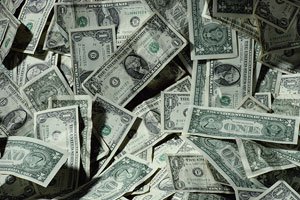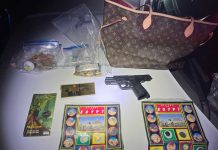For a split second, I thought I was rich. Then reality hit.
First, the cynicism that comes with years of reporting kicked in.
Second, I’m just not that lucky. You see, I received a check for
$3,785 from Fairview Marketing out of Burlington, Ontario, Canada.
According to the letter, my name was randomly selected by a
computer database as one of 20 winners. I was supposed to deposit
the check and then send them a check for $2,975 to pay fees so they
could send the remainder of the $250,000 prize I had won. Yeah,
right.
For a split second, I thought I was rich. Then reality hit. First, the cynicism that comes with years of reporting kicked in. Second, I’m just not that lucky. You see, I received a check for $3,785 from Fairview Marketing out of Burlington, Ontario, Canada. According to the letter, my name was randomly selected by a computer database as one of 20 winners. I was supposed to deposit the check and then send them a check for $2,975 to pay fees so they could send the remainder of the $250,000 prize I had won. Yeah, right.
This is just one of many scams run mostly by crooks from other countries, said Morgan Hill Detective Ken Howard, who investigates financial crimes, though those from out state and out of the country are nearly impossible to prosecute.
“Realistically, we don’t have the resources to fully investigate these crimes,” Howard said. “But, if we think we have leads, we forward (the case) to the FBI.”
So, after my anger subsided, I decided I’d follow the instructions and see exactly how this scam works. I called the number, (647) 865-3670, and spoke with “Ray Scott,” my “claim agent.”
He answered and – after confirming a number on the letter sent to me – immediately told me that I was “one step away from changing my whole financial life.” I played along, telling him I was anxious to follow the instructions. So, that day – knowing the check would be returned for one reason or another – I deposited it through the ATM into my savings account.
The very next day, I went to the bank to withdraw money from my checking account only to learn the bank had restricted use of my accounts – meaning I could not withdraw any money. So, after a visit to a teller, who told me to call a 1-800 number and talk to customer service, I went to my truck in the bank parking lot and did as I was told.
After 20 minutes the customer service representative told me to go back into the bank and talk to the manager. Getting frustrated, I re-entered the bank and found the manager. The look of disbelief in her eyes after I told her why I did what I did told me this might not be as easy as I originally thought.
But it was. She quickly got me access to my checking account, but said my savings account would remain restricted until the check was returned. A few days later, I got a copy of what the bank said was a counterfeit check – oh, and that there would be a $10 charge. Figures.
So, a few days later I called Ray Scott back to ask him why he sent me a counterfeit check, hoping to get the phone call on tape. But, as Howard said, and as I expected, these types of scams are short-lived. A woman’s pre-recorded voice said “the customer you are calling is unavailable at the moment.”
Well, Ray Scott has been unavailable at the moment for more than a week now.
Howard said this type of scam is just one of many, most of which are aimed primarily at the elderly. Others include the “pigeon drop,” the “double-play” and the “Latin lotto,” the key element of which is convincing the potential victim they can share in a large sum of money. But there are others as well, including the fake contractor who will ask for money up front then not finish the job or do substandard work, and a fortune-telling scam designed to financially exploit victims by convincing them that valuables such as jewelry or money is cursed and only the fortune teller can remove the curse.
Howard offered a host of clues to watch for, but perhaps the best was: “If it looks too good to be true, it probably is.”















